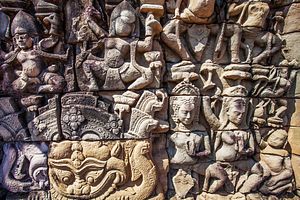For centuries, British colonialists would quip that they were doing the world a favor by relieving conquered territories of their historical artifacts. Whether it was Chinese frescoes smuggled out along the Silk Road, aboriginal remains from Australia or ancient relics from Egypt, the argument was they were being taken to be put in museums and preserved for posterity.
The sub-text, however, was that the indigenous were incapable of looking after their own cultural heritage while colonial cynics would counter that such arguments were contrived simply to justify the theft of artworks worth millions of dollars.
Such historical accusations were behind the return of a Cambodian statue taken from near the ruins of the 12th century temples at Angkor Wat. The statue of an ancient Hindu warrior had come up for auction at Sotheby’s and this had prompted the U.S. authorities to act.
Lawsuits were initiated, Sotheby’s was irritated and the $2 million statue was returned with the total cost incurred by the American taxpayers. By most reckonings it was a victory for common sense and American generosity over a European art market that has traded on looted artifacts for centuries.
But celebrations have been tinged by a group of Cambodian security guards.
As the Hindu warrior was being packed for the trip home, Cambodia’s only relics of Buddha were stolen from the former royal capital at Odong where some hair, teeth and bones of the Buddha were kept, supposedly under tight security.
They were enshrined there in 2002 after being brought here about half a century earlier from Sri Lanka to mark the 2,500th anniversary of Buddha’s birth. In 1989, they were installed in a stupa in front of the Phnom Penh railway station until the late King Father Norodom Sihanouk had them moved them to Odong.
Suspicions immediately fell on the Cambodian guards, amid a chorus of outrage from senior clergy, politicians and an array of people from the arts community who fear the theft and probable sale will cost Cambodia its chance to have Odong listed as a World Heritage Site with UNESCO.
Worse, others see the theft as a symbol of Cambodian ills.
This became clear when 200 monks overwhelmed the annual conference of Buddhist clergy at the Chaktomuk Hall in the capital where they demanded that senior monks push Prime Minister Hun Sen to locate the national treasures.
They also held up a banner that said: “Because of corruption, the relics were stolen.”
The guards assigned to protect the Buddha relics were paid less than $45 a month, a minuscule sum in anybody’s language made far worse when given the historical significance of the assignment these men had been entrusted with. But even worse is the prospect that the Cambodians may have given British paternalism an unwanted, nice little shot in the arm.
Luke Hunt can be followed on Twitter at @lukeanthonyhunt.

































